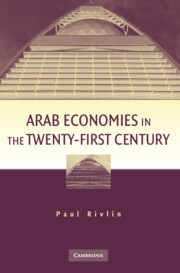11 - Syria
Lost Potential
Published online by Cambridge University Press: 05 June 2012
Summary
Syria's population is growing by nearly 2.5 percent a year and the labor force by 4 percent, which is among the fastest rates of growth in the region. Economic growth has been sustained by high oil revenues, but oil production has fallen and is expected to continue. The economy suffers from massive government intervention despite elements of reform over the past twenty years. Economic growth has decelerated since the late 1990s and has barely matched that of the population. Syria's involvement in Lebanon remains extensive but the economic implications, while significant, are difficult to quantify. It is one of a number of political and military factors that have to be considered to understand the country's serious plight.
Population Growth
The rapid growth of population has been the most serious problem facing Syria. In 1960, Syria had a population of just 4.6 million, in 1970, 6.4 million, in 1990, 12.8 million, and in 2000, 16.8 million. The population growth rate declined over the last quarter of a century from an annual average 3.76 percent in 1980–5 to 2.49 percent in 2000–05 (see Table 11.1). The rate remains fast and poses formidable problems in terms of providing basic services and employment. Between 1995 and 2005, the total population increased by 29 percent, the working-age population by 48 percent, and the dependent population by only 7.5 percent.
- Type
- Chapter
- Information
- Arab Economies in the Twenty-First Century , pp. 240 - 265Publisher: Cambridge University PressPrint publication year: 2009



